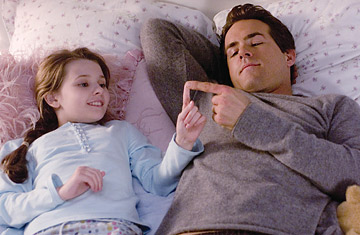
Modern romantic farce, phone home: Ryan Reynolds and Abigail Breslin in Definitely, Maybe.
Divorced daddy Will Hayes (Ryan Reynolds) picks up his daughter after school, looking forward to her weekend visit with him. But he finds little Maya (Abigail Breslin) and half the school in a tizzy; they just had a sex education class that was, perhaps, somewhat premature for some of the students. At home that night she insists that he tell her the story of his marriage to Mommy, which becomes an account of his young manhood and its significant romantic interludes. He insists on giving false names to the three women with whom he was most memorably involved, forcing the child to guess which one was her mother. Eventually, she learns the truth and then, in a kind of coda, gets involved with helping Will choose her new stepmom.
The three women are Emily (Elizabeth Banks), a rather gelid blonde whom he leaves behind at the University of Wisconsin to take a job with Bill Clinton's New York campaign in 1992; April (Isla Fisher), a smart, but intellectually and emotionally drifting colleague in the campaign; and Summer (Rachel Weisz), an ambitious journalist who eventually betrays him after he has begun a promising career as a political consultant. It is, I suppose, a premise, of sorts, but as writer-director Adam Brooks's Definitely, Maybe galumphs along, it is not a particularly romantic or comedic one. Of them all — Hayes included — only Fisher's character has real spunk, although Kevin Kline (unbilled but not uncredited) contributes some snappish cynicism as a priapic professor and big thinker. Fisher has most of the few good lines the movie offers. She's a bit of an enigma, too. How can such an obviously bright young woman be so endlessly feckless?
The movie (which, ludicrously enough, is being released as a Valentine Day's bonbon) never really answers that question. Seems she just had a lot of growing up to do — and a lot more besides. The film also suffers from its flawed central plot device: that story the daddy tells his little girl. It's sanitized, of course — all sexual components cleansed — but even so it is discomfiting. It's a tale most fathers would resist telling a child — maybe even a fully grown one. And the actors have trouble with it. Reynolds can't help looking rather shifty as he relates his story and Breslin, who was so wonderful in Little Miss Sunshine, is obliged to play a standard-issue wise child, the kind of kid moviemakers think charming and audiences often feel like placing under a gag order. It's possible, I think, that Brooks — who wrote Bridget Jones: The Edge of Reason— may have wanted to do something in a slightly more serious vein. He seems to want to offer an examination of how people really want to be more committed — both politically and personally — but get sidetracked by events and issues that are beyond their control.
It's an odd thing, but in recent years, just about every movie that attempts a sophisticated take on romance has turned out to be strained and witless. All the successful recent comedies (The 40 Year Old Virgin, The Wedding Crashers, Knocked Up, to name three) have tended toward the raunchy end of the spectrum. It's as if Hollywood's wise guys have recognized that middle-class American life is just too complicated, perhaps even too inherently miserable, to get an intelligent handle on. You can't quite treat it as a tragedy, but you can turn to its first cousin — farce — and have some profitable fun with it. And who can blame them? Or us, for the benumbed state that something like Definitely, Maybe leaves us in.
